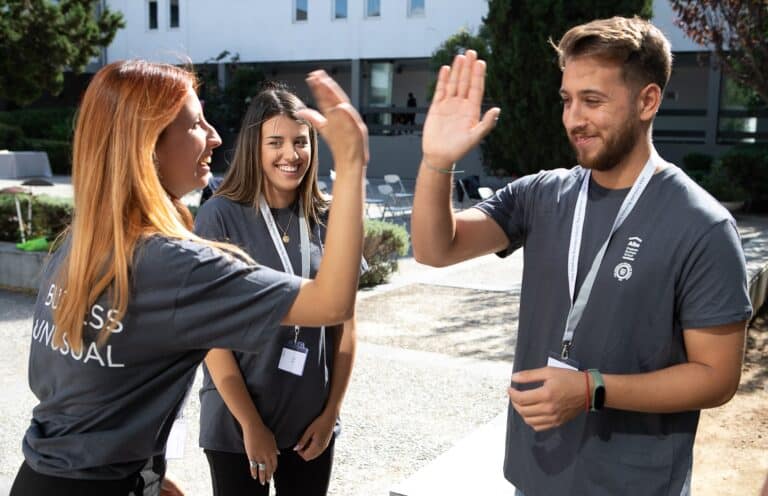This article was originally published on our blog in Spanish. You can find the original article here.
Letters of recommendation what to do and what not to do when asking for help from your mentors
So you are determined to obtain a scholarship to continue training, do internships abroad or embark on a master’s degree program? You have already reviewed our initial entry to the scholarships, and you think you have the potential, that you are a good candidate. You’ve been searching, and you’ve finally come across a juicy call that fits what you’re looking for. You go straight to the requirements, and you fulfill them, you go to the required documentation, and you read: photocopy of the DNI, photocopy of your academic record, the registration certificate … Perfect, you have everything perfectly organized and located in your tailor’s box, you go to spare time before the deadline of the call. You continue reading and, at the end of all the requirements and documents to send, you are in for a surprise: you need letters of recommendation from one or even several of your mentors. At this point, it is normal for doubts to assail us.
What is this?
What do they have to say about me?
Who do I ask?
Let’s solve these doubts, in parts.
What are letters of recommendation?
A letter of recommendation is, as the name implies, a letter in which someone recommends you as a good student, good worker or in general, as a good candidate when a company or institution chooses you before to another person. The letters of recommendation are not nonsense and are usually the part that consumes more time and effort in any call.
When requesting a letter of recommendation, the person who intercedes on your behalf is putting its prestige as a professional in the game. First of all, you will be introducing yourself to the work or academic world, a lousy job on your part will also mean that your recommendations are not reliable. Always keep in mind that your mentor is doing you a great favor and that you must act accordingly.
Related:
[All You Need To Know About Edinburgh Napier University]
[Are You Thinking Of Studying At University College Cork? Here’s What You Need To Know]
What should they include?
A letter of recommendation does not have a universal format. However, there is usually a more or less common format in which it is presented by the person who writes it, exposes their credentials (teacher, doctor, director …) and also at what time and under what circumstances they’ve worked with you. Once that is done, you will comment on the positive aspects of this work if you have been proactive, effective, responsible … And in general, how happy are you with your results? Notwithstanding, a letter of recommendation will never state the negative aspects of your work, however, the letter is going to act as a testimony declaring how well you’ve worked and also how worthy you are. Hence, you should be given precedence.
Who can you ask for?
This is the most frequent doubt, especially if you are still in the early stages of your academic life. What happens if I am asked for a letter of recommendation from a third career? This does not usually happen, but the truth is that any teacher can make you a letter of recommendation, just like other tutors or any experienced professional who intercedes for you. However, as I said, the letter will have to come specifying the type of relationship that has been maintained with you. A letter from any teacher will not be as useful as that of your end-of-career tutor, for example.
If you have not finished the race, it is recommended that you ask for a recommendation to a teacher with whom you have had some good encounter with. It may be that you have gotten a very good grade and enjoyed your subject or that you were part of another type of activity outside of school hours, whatever the case may be; the more they know about you and how you work, the better the letter of recommendation will be. If you have already finished the race, the most normal thing is to ask your end of degree work supervisor; if you have already finished the master, you can choose both the supervisor of the end-of-degree and the master’s degree … And the list goes on, the more you worked with that person, the better.
Related:
[The 3Ws Of The Visa Applications For Students]
[Study In The Netherlands: Universities To Consider]
[Do You Want To Write Great Articles? Use LaTeX]
How to ask for a recommendation by keeping the forms
Asking for recommendations, even when you have a good deal with the teacher, is usually a bit embarrassing. You can have a good relationship, but, after all, you are asking them to vouch for you and to ensure that you put in the when it comes to working. It’s a lot to ask, but remember its part of your job. Chances are you will not be the first or last student to ask for a recommendation, it is best to ask without further ado.
This also does not mean that we should not save the forms. When it comes to asking for a letter of recommendation, it is best to explain the situation, why you need it and kindly ask for their collaboration. Normally they will write to you, although, if your referee has only been your tutor for a few months, do not expect anything extremelly good. They are obviously not going to tell a lie and put their prestige at stake for you. Also, remember you are asking for a favor. This means that they may not want to do it and kindly decline the offer, do not be discouraged.
How does the recommendations system work?
While reading this post you’ve probably asked yourself questions like What differentiates real from fakes? Could someone self-recommend? A priori seems easy, but the system is more complex than it seems. To begin, these letters of recommendation have to be signed and have to present the official seal of the university or the center in which your supervisor works. If this isn’t enough, the letters of recommendation must have enough data to be able to contact the person who wrote it. It does not always happen, but generally, the institution requesting the letter is going to contact you, it will make calls and confirm that the data is real, that you have worked with that person and that this person confirms that he recommends you.
Sending the contact details of the teacher or supervisor who supports your request to the institution is another system in which recommendations may work. Although it is less frequent, these will personally take care of calling or sending an email to the teacher to personally intercede for you, avoiding possible forgeries or slight changes in the content of the letter in your favor. This way you never have access to the letter, and you do not know what is in it.
Inform your tutors when you have sent it!
It is very important and essential to inform your supervisors beforehand after you’ve finally sent the letter. It seems obvious, but it is for your own good that your supervisor is aware so that the call does not arrive as a surprise.
Letters of Recommendation are not recyclable
Receiving your letter of recommendation can take only a few days, sometimes weeks or months. Everything depends on your supervisor, the free time you have and the desire you have to recommend. But, once you have your letter of recommendation and you send it … you cannot reuse it. Letters of recommendation are for single use. They are sent to the institution, they have a date and a name, and you cannot use them more than once. If in the future you need another, you will have to return to that kind teacher to ask him to repeat the process. There is no shortcut, you can take the first example, but it cannot be the same again. This is why letters of recommendation are almost always the slowest part of applications. Your tailor’s box, this time, will not be useful. If you need letters of recommendation, do not delay in asking them.
With this, I hope all your doubts are now resolved. If you still have questions, remember that you can comment on this post or Facebook on EDUopinions so that we can help you personally and for free, because that’s how we do things at EDUopinions, always thinking about helping the companions. If you want to help us continue to help you, think about your university here and do not forget to share our posts. Thank you and see you next time!
Recent Posts

If you're thinking of studying a technical subject like engineering at university, it's crucial that you choose a university that has a rigorous ...

Although it's possible to sail through university without giving a thought to what you're going to do afterwards - concentrating only on enjoying ...

Ever thought about studying in Greece? Between the sunny weather, incredible history, and breathtaking coastline, you could also get a top business ...

